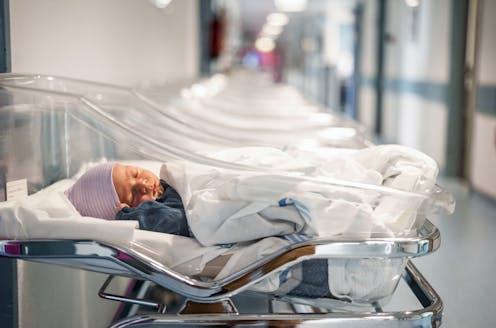Russia's invasion is wreaking havoc with surrogacy in Ukraine. It shows why Australia must change its laws
- Written by Ronli Sifris, Senior lecturer in law, Deputy Director of the Castan Centre for Human Rights Law, Monash University

Russia’s invasion of Ukraine is a nightmare for prospective parents engaged in surrogacy arrangements in the country.
Ukraine has become a popular destination for surrogacy. While exact numbers are difficult to obtain, it’s estimated[1] between 2,000 and 2,500 babies are born each year via surrogacy in Ukraine.
BioTexCom[2], one of the largest fertility clinics in Ukraine, is expecting 200 babies[3] to be born via surrogacy by the end of May.
More than ten Australian families[4] are expecting babies to be born via surrogacy in Ukraine by the first week of May.
But it’s currently extremely challenging for such parents to cross the border into Ukraine to meet their babies. This is a disaster for the babies, the surrogates and the intended parents.
The babies are left in limbo, born into a war zone without their parents to look after them. The surrogates have to give birth in a war zone and then aren’t able to hand the babies over to the intended parents.
As for the intended parents[5], one can hardly imagine how distressing it must be to know your baby has been born, or is about to be born, but not know how or when you can reach them.
The situation highlights why Australia must change its surrogacy laws.
Why are Australians travelling to Ukraine for surrogacy?
Ukraine is a popular surrogacy destination for several reasons.
One is financial[6]. Surrogacy in Ukraine is more affordable than in the United States, for example. Surrogacy in Ukraine is estimated[7] to cost approximately USD $40,000 (A$54,000), whereas surrogacy in the United States can cost[8] as much as USD $150,000 (A$202,000).
Another is legal[9]. Under Ukrainian law, unlike in Australia for example, the intended parents are recognised as the legal parents of a child born through surrogacy at birth.
Although it’s worth noting only heterosexual married couples are able to access surrogacy in the country.
Read more: Arrests and uncertainty overseas show why Australia must legalise compensated surrogacy[10]
For the vast majority of people, surrogacy isn’t their preferred way to have a child, but an option of last resort[11].
For example, for one Australian couple, the topic of a recent Sydney Morning Herald article[12], surrogacy was their only option. They’d lost three pregnancies, and their use of surrogacy in Ukraine was the culmination of an excruciating six-year journey.
Australian laws encouraging cross-border surrogacy
The stress involved in cross-border surrogacy highlights this further. The vast majority of Australians who travel overseas to access surrogacy arrangements would prefer to do so back home, but Australian law[13] presents a significant obstacle.
In Australia, only “altruistic surrogacy” is permitted, where the surrogate mother doesn’t benefit financially from the arrangement.
But “compensated” or “commercial” surrogacy, where the surrogate does receive a financial benefit, is prohibited.
The prohibition of compensation is problematic for a number of reasons. From the perspective of the surrogate, it’s inherently exploitative to refuse to allow a woman to be paid for her reproductive labour. And the obsession with “altruism” amplifies problematic stereotypes and expectations of the “self-sacrificing woman”.
From the perspective of intended parents, the prohibition of compensation has led to a predictable dearth of Australian women willing to become surrogates.
This has fuelled the popularity of cross-border compensated surrogacy, which is illegal for residents of New South Wales, Queensland and the ACT but widely undertaken.
What’s the solution?
All Australian states and territories should amend their laws to allow for compensated surrogacy.
Regulating behaviour that is already occurring, and to which law enforcement is turning a blind eye[14], has three key benefits:
regulation ensures the rights of all parties are protected properly. Regulation in Australia can prevent exploitation abroad
in a country like Australia, which has a social safety net in place to protect those who are most vulnerable, the question of compensation can be separated from exploitation
compensation is a matter of justice. It’s unjust to allow many of the people involved in providing surrogacy – clinics, lawyers, counsellors and others – to be compensated for their time and services, but not the person doing the most labour and assuming the greatest risk.
The anxiety around legalising and regulating compensated surrogacy in Australia does not make sense[15].
Australia’s legal system has the capability to do this, and in doing so, would minimise the risk of exploitation.
This would also likely reduce the number of Australians going overseas for compensated surrogacy, with the risks and stressors that comes with that.
The most sensible solution, and the solution that best protects the rights of all involved, is for Australia to properly regulate (rather than prohibit) compensated surrogacy arrangements so desperate intended parents aren’t forced overseas.
References
- ^ estimated (www.bionews.org.uk)
- ^ BioTexCom (biotexcom.com)
- ^ expecting 200 babies (www.theatlantic.com)
- ^ More than ten Australian families (www.smh.com.au)
- ^ intended parents (www.smh.com.au)
- ^ financial (www.sensiblesurrogacy.com)
- ^ estimated (www.abc.net.au)
- ^ can cost (www.creatingfamilies.com)
- ^ legal (www.sensiblesurrogacy.com)
- ^ Arrests and uncertainty overseas show why Australia must legalise compensated surrogacy (theconversation.com)
- ^ option of last resort (www.smh.com.au)
- ^ article (www.smh.com.au)
- ^ Australian law (www.surrogacyaustralia.org)
- ^ turning a blind eye (www.smh.com.au)
- ^ does not make sense (legal.thomsonreuters.com.au)

















